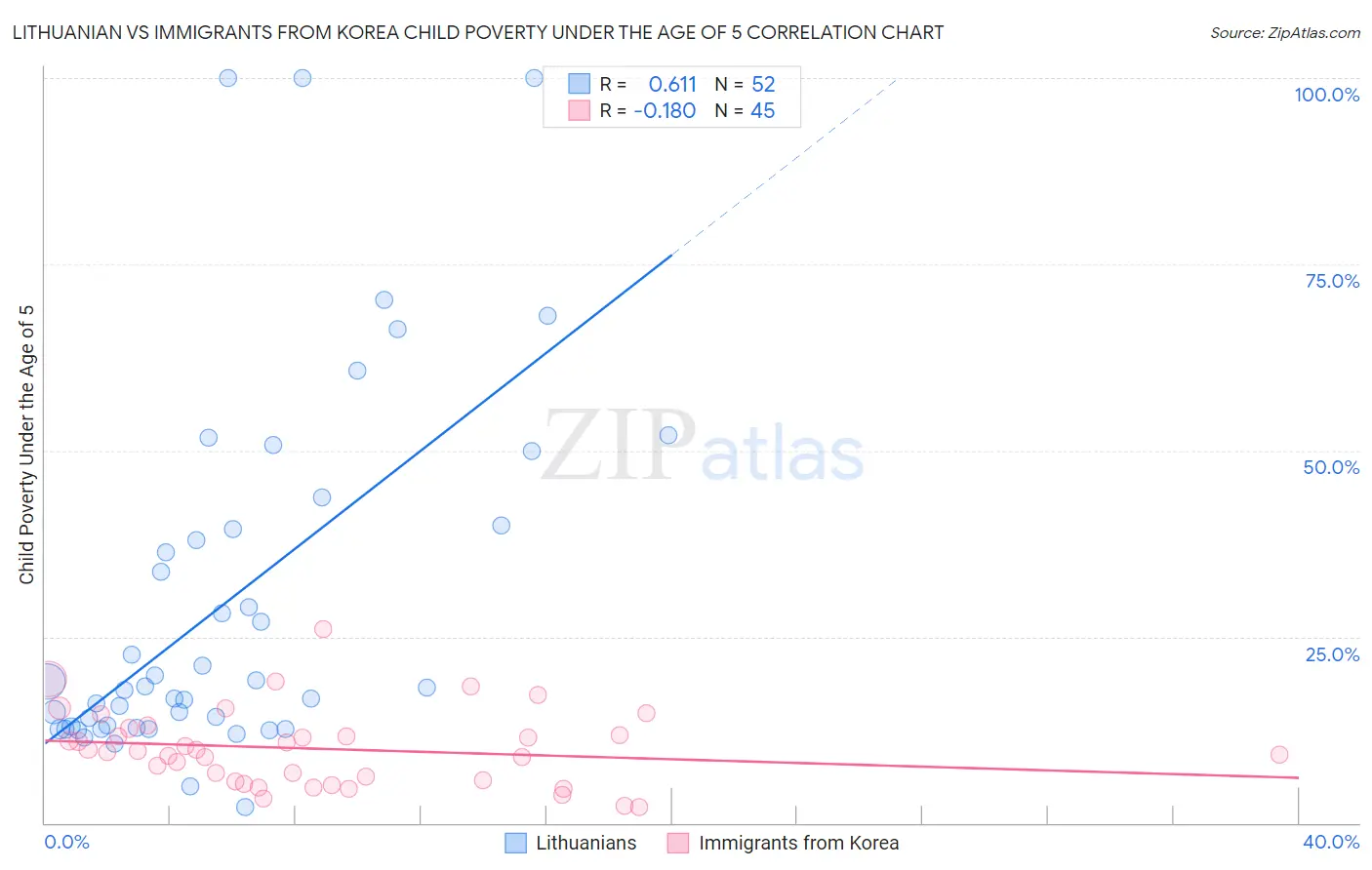Lithuanian vs Immigrants from Korea Child Poverty Under the Age of 5
COMPARE
Lithuanian
Immigrants from Korea
Child Poverty Under the Age of 5
Child Poverty Under the Age of 5 Comparison
Lithuanians
Immigrants from Korea
15.2%
CHILD POVERTY UNDER THE AGE OF 5
99.0/ 100
METRIC RATING
69th/ 347
METRIC RANK
13.2%
CHILD POVERTY UNDER THE AGE OF 5
100.0/ 100
METRIC RATING
11th/ 347
METRIC RANK
Lithuanian vs Immigrants from Korea Child Poverty Under the Age of 5 Correlation Chart
The statistical analysis conducted on geographies consisting of 398,178,552 people shows a significant positive correlation between the proportion of Lithuanians and poverty level among children under the age of 5 in the United States with a correlation coefficient (R) of 0.611 and weighted average of 15.2%. Similarly, the statistical analysis conducted on geographies consisting of 396,775,886 people shows a poor negative correlation between the proportion of Immigrants from Korea and poverty level among children under the age of 5 in the United States with a correlation coefficient (R) of -0.180 and weighted average of 13.2%, a difference of 14.7%.

Child Poverty Under the Age of 5 Correlation Summary
| Measurement | Lithuanian | Immigrants from Korea |
| Minimum | 2.2% | 2.2% |
| Maximum | 100.0% | 26.0% |
| Range | 97.8% | 23.8% |
| Mean | 29.8% | 10.0% |
| Median | 18.3% | 9.6% |
| Interquartile 25% (IQ1) | 12.9% | 5.6% |
| Interquartile 75% (IQ3) | 39.7% | 12.3% |
| Interquartile Range (IQR) | 26.9% | 6.7% |
| Standard Deviation (Sample) | 24.5% | 5.1% |
| Standard Deviation (Population) | 24.2% | 5.0% |
Similar Demographics by Child Poverty Under the Age of 5
Demographics Similar to Lithuanians by Child Poverty Under the Age of 5
In terms of child poverty under the age of 5, the demographic groups most similar to Lithuanians are Zimbabwean (15.2%, a difference of 0.010%), Greek (15.2%, a difference of 0.020%), Immigrants from Scotland (15.2%, a difference of 0.080%), Immigrants from Fiji (15.2%, a difference of 0.19%), and Immigrants from Romania (15.2%, a difference of 0.22%).
| Demographics | Rating | Rank | Child Poverty Under the Age of 5 |
| Immigrants | Eastern Europe | 99.1 /100 | #62 | Exceptional 15.1% |
| Immigrants | Europe | 99.1 /100 | #63 | Exceptional 15.1% |
| Immigrants | Romania | 99.1 /100 | #64 | Exceptional 15.2% |
| Immigrants | Fiji | 99.0 /100 | #65 | Exceptional 15.2% |
| Immigrants | Scotland | 99.0 /100 | #66 | Exceptional 15.2% |
| Greeks | 99.0 /100 | #67 | Exceptional 15.2% |
| Zimbabweans | 99.0 /100 | #68 | Exceptional 15.2% |
| Lithuanians | 99.0 /100 | #69 | Exceptional 15.2% |
| Immigrants | Belgium | 98.8 /100 | #70 | Exceptional 15.3% |
| Immigrants | Egypt | 98.8 /100 | #71 | Exceptional 15.3% |
| Immigrants | Sweden | 98.8 /100 | #72 | Exceptional 15.3% |
| Immigrants | Ukraine | 98.7 /100 | #73 | Exceptional 15.3% |
| Argentineans | 98.5 /100 | #74 | Exceptional 15.4% |
| Immigrants | Argentina | 98.5 /100 | #75 | Exceptional 15.4% |
| Croatians | 98.5 /100 | #76 | Exceptional 15.4% |
Demographics Similar to Immigrants from Korea by Child Poverty Under the Age of 5
In terms of child poverty under the age of 5, the demographic groups most similar to Immigrants from Korea are Immigrants from South Central Asia (13.3%, a difference of 0.10%), Burmese (13.2%, a difference of 0.11%), Bhutanese (13.4%, a difference of 0.86%), Immigrants from Iran (13.1%, a difference of 1.2%), and Iranian (13.1%, a difference of 1.4%).
| Demographics | Rating | Rank | Child Poverty Under the Age of 5 |
| Thais | 100.0 /100 | #4 | Exceptional 12.3% |
| Immigrants | Hong Kong | 100.0 /100 | #5 | Exceptional 12.4% |
| Immigrants | Singapore | 100.0 /100 | #6 | Exceptional 12.9% |
| Chinese | 100.0 /100 | #7 | Exceptional 13.1% |
| Iranians | 100.0 /100 | #8 | Exceptional 13.1% |
| Immigrants | Iran | 100.0 /100 | #9 | Exceptional 13.1% |
| Burmese | 100.0 /100 | #10 | Exceptional 13.2% |
| Immigrants | Korea | 100.0 /100 | #11 | Exceptional 13.2% |
| Immigrants | South Central Asia | 100.0 /100 | #12 | Exceptional 13.3% |
| Bhutanese | 100.0 /100 | #13 | Exceptional 13.4% |
| Okinawans | 100.0 /100 | #14 | Exceptional 13.4% |
| Indians (Asian) | 100.0 /100 | #15 | Exceptional 13.4% |
| Immigrants | Eastern Asia | 100.0 /100 | #16 | Exceptional 13.5% |
| Assyrians/Chaldeans/Syriacs | 100.0 /100 | #17 | Exceptional 13.6% |
| Immigrants | China | 100.0 /100 | #18 | Exceptional 13.6% |